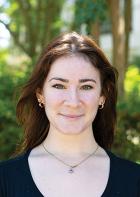Maura Shapiro
Fall
2022
Alumni Spotlight
Maura Shapiro
BS in Physics, BA in Communication and Rhetoric, University of Pittsburgh
 What she does
What she does
I cocreate and cohost Initial Conditions: A Physics History Podcast, which shares underreported and unconventional stories from physics history. For most of my physics education, all I knew about physics history was the names in textbooks that modified equations, laws, and models. Very few of those physicists are women or people of color, and this limited view of history propagates the notion that science advancements are the result of a few brilliant scientists.
In the podcast we dive into the overlooked stories behind physical discoveries. We challenge the conventional narrative of what it means to be a physicist. To do this, I read A LOT. Not just books and journal articles, but also primary sources and archival materials. After all the research is finished comes the fun part: shaping the information into a story and sharing it on the podcast!
How she got there
Growing up, I loved history, science, politics, and podcasts, but it never occurred to me that there was a way to combine them. Though seemingly different fields, all my interests are grounded in storytelling—even physics, which tells the story of the universe! I took public speaking and communication courses to learn how to be an effective storyteller and understand meaningful ways to convey a message. Early on in my physics career, I realized that I preferred communicating physics to a general audience over doing physics research. I also knew that science communication was a niche but vital field and was excited that it spoke directly to my skill set.
As I was developing my communication skills and progressing in my physics degree, I discovered my love of learning about the people behind the physics. Through my observational astronomy research at the historic Allegheny Observatory, I learned about the Pittsburgh lensmaker John Brashear. Despite very little education, he became one of the most important figures in early modern astronomy. (You can learn more about him in Episode 9 of Initial Conditions!) I also worked in the university library, organizing the records of a past physics professor. I sorted through boxes of his records, notes, and correspondence and became immersed in his life. I had never done this kind of research before and found learning about the history of physics in this deeply personal way to be incredibly rewarding.
After I graduated, I was an SPS summer intern for the Niels Bohr Library & Archives and Center for History of Physics at the American Institute of Physics. I created teaching guides about women and people from underrepresented groups in physics and felt all my interests click into place. I was learning about history, physics, and how to combine them to tell a story. More importantly, I was advocating for the representation of women and people of color in physics education. After two months doing the most fun and meaningful work I could imagine, I struggled to envision myself doing anything else. I am grateful that today, as a physics history podcaster, I am always learning new things and growing a deeper appreciation for physics.
Advice to physics students
- Explore all your interests—even if there is no obvious “professional” application. Developing and nurturing a broad set of interests brings balance to your life, diversifies your skills, and enables you to see problems in different ways.
- Practice public speaking and performing! Speaking in front of a crowd develops confidence and presentation skills, which are helpful in every field.
- Reach out to people doing things you’re interested in and ask for an informational interview! The worst thing that could happen is they say no or do not respond. In that case, you’re no worse off than when you started! If they do accept, make sure you prepare by reading about their career and coming to the meeting prepped with questions and your own elevator pitch.
- Remember that your value is not defined by grades, clubs, research, internships, or whatever. You are the only person who can decide what success means to you.
- Surround yourself with people who inspire you and support you! I would not have a degree in physics without the people who encouraged me!
Learn More About…
- SPS Internships at spsnational.org/programs/internships
- The Niels Bohr Library & Archives and Center for History of Physics at aip.org/history-programs
Initial Conditions: A Physics History Podcast
Initial conditions provide the context in which physics happens. Likewise, in Initial Conditions: a Physics History Podcast, we provide the context in which physical discoveries happened. We dive into the collections of the Niels Bohr Library & Archives at the American Institute of Physics to uncover the unexpected stories behind the physics we know. Through these stories, we hope to challenge the conventional narrative of what it means to be a physicist. Check it out at aip.org/initialconditions or wherever you get your podcasts.
